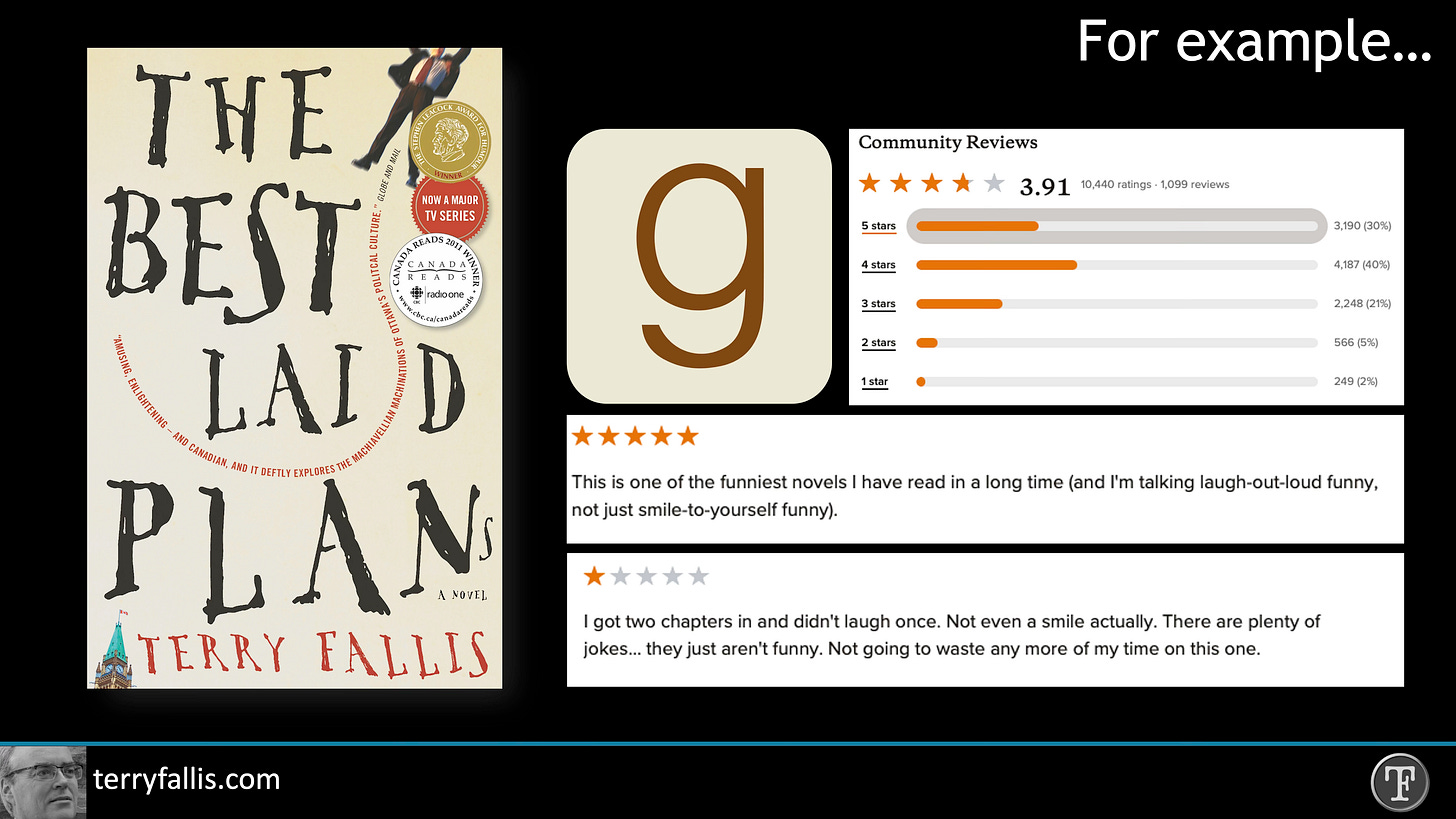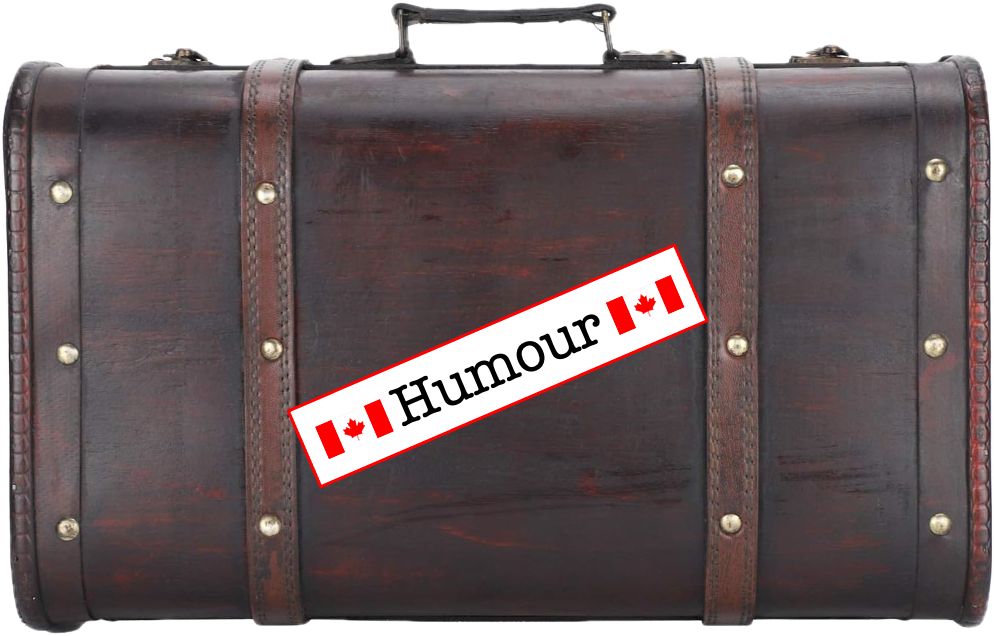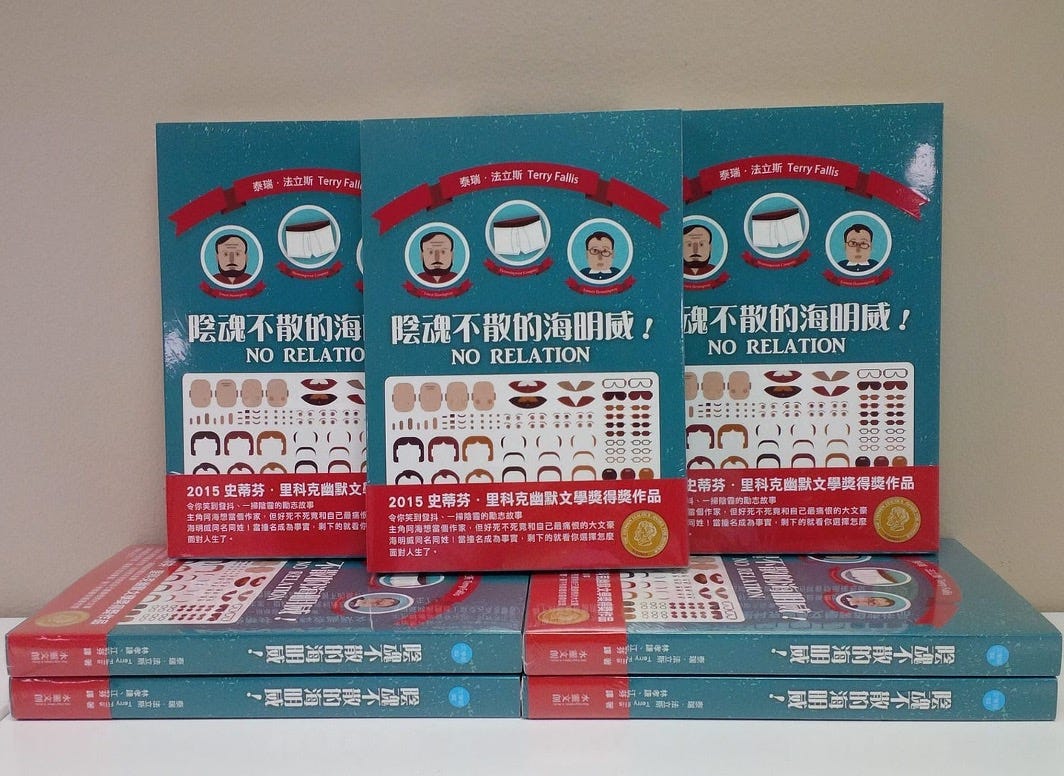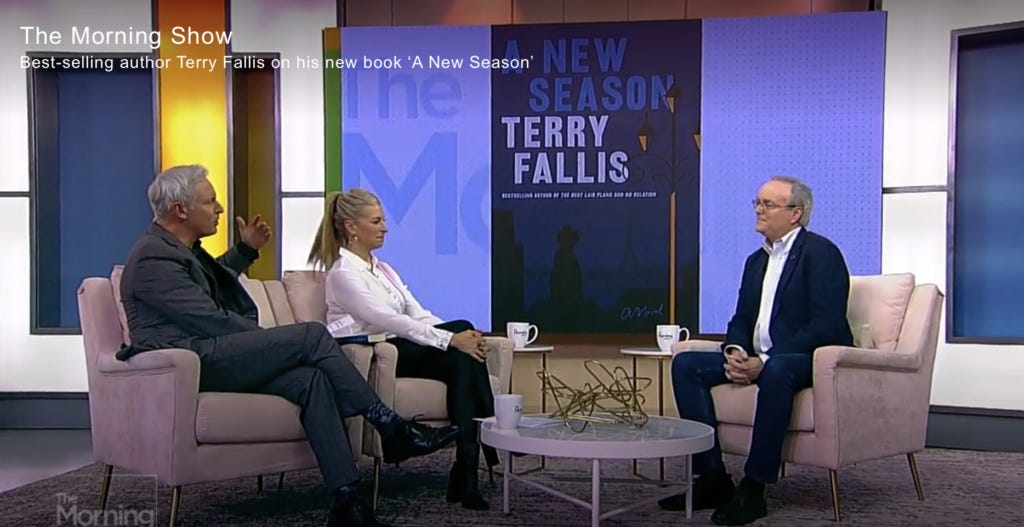Why aren't there more funny novels? Plus a TV interview and more...
Writing life: 47
If you celebrate at this time of year, Season’s Greetings, and all the best for a happy and healthy 2024.
On the paucity of funny novels…
It’s a question that has long bedevilled, bewildered, and befuddled great literary minds. I’ve also given it some thought. I don’t think there’s yet general agreement on why writers don’t create more novels that make us laugh and think—ideally at the same time—but I do have a few ideas on this perplexing topic.
Setting the context
When I first discovered comic novels back in my mid to late twenties, I had a tough time finding novels that made me laugh. It was Robertson Davies, Mordecai Richler and John Irving who kickstarted my affection for comic novels. I then went on to read and love the books of Nora Ephron, Christopher Buckley, Donald Jack, Paul Quarrington, John Kennedy Toole, Dorothy Parker, Christopher Moore, Will Ferguson and many others. But I was struck by how few writers wrote funny novels, or even occasionally employed humour in more serious novels. It was so much easier to find scary novels, romantic novels, suspense-filled novels, sad novels, literary novels, historical novels, and novels from many other genres. But it was always a challenge to find novels that promised to tickle my funny bone.
To make matters worse, when I did find novels that guaranteed “a chuckle on every page,” or that I’d “split my side laughing,” I often barely cracked a smile when reading them. It’s possible that I have a high laughter threshold courtesy of growing up in a household where humour was a daily staple, but far too often I just didn’t find many alleged comic novels to be particularly funny. (Many readers might say the same about my humble offerings, and that foreshadows my principal point, coming up soon.)
I also know at least a few writers who are funny in their daily lives and interactions with others, but whose writing does not often reflect their well developed senses of humour. They don’t often imbue their stories with the keen sense of humour they deploy in virtually every other aspect of their lives. Interesting and puzzling.
Now, nearly 40 years later, and after penning nine comic novels of my own (though I’m not sure I’d describe my latest, A New Season, as a “comic novel”), I like to think I’ve learned a thing or two about the paucity of funny writers and novels. Here goes…
One reader’s “hilarious” is another’s “cringeworthy”
The human sense of humour is extraordinarily diverse across the population. We don’t all laugh at the same things. I think there is more variety in our senses of humour than in any other aspect of our human emotions and behaviours.
One of the most polarizing questions I’ve ever asked in a crowded room is “Who likes The Three Stooges?” (Incidentally, I ask that question every year when teaching the Humour Writing course at the University of Toronto’s School of Continuing Studies.) In short, you either love the Stooges or you hate them. You can sometimes (but not always) separate the lovers and haters along gender lines, and sometimes by age, but it’s a question that definitely divides a room. (Just to be up front about it, I grew up watching The Three Stooges and their physical brand of comedy still makes me laugh, though I fully understand the haters’ perspective.)
Moreover, this broad diversity in our senses of humour is complemented by much more uniformity in how people and/or readers respond to other human emotions and behaviours like suspense, horror, romance, etc. This leads me to…
The qualitative research I’d like to see
I’ve only ever speculated on this, but I like to think of it as informed conjecture—if that term is not too oxymoronic for you. To prove, or at least support, my theory, here’s the focus group test I’d like to undertake among a representative sample of readers:
Each person in the focus group would be directed to read the same four novels written by respected authors, well known in their respective literary lanes. The group would read one horror novel, one romance novel, one suspense-filled thriller, and one comic novel.
Each reader would be asked to mark the pages, paragraphs, or sentences when they were frightened or terrified in the horror novel, heartbroken or joyful in the romance novel, filled with heart-pounding suspense in the thriller, and finally, struck by laughter and mirth in the comic novel. (You can probably see where I’m going with this.)
My prediction is that there would be considerable agreement and uniformity—at least a clear consensus—among the focus group readers on the pages, paragraphs and sentences marked in the first three novels. But, I contend, there would be considerably less agreement—perhaps even marked differences—across the readers on which pages, paragraphs and sentences in the comic novel sparked laughter or amusement, if any. And therein lies the rub for aspiring or even accomplished humour writers.
If you believe this hypothesis, and are hoping your writing will trigger paroxysms of laughter, you must accept that not every reader will embrace your particular sense of humour, and indeed, some will actively reject it. You’ll only connect with some of your intended audience, not all of it. That is the reality every humour writer faces.
Here’s hardcore evidence from Goodreads to back up my point. Presented below is a slide I use when teaching at Uof T or leading humour writing workshops. It shows two consecutive reader reviews of my debut novel, The Best Laid Plans, that reflect polar opposite opinions and wildly diverging senses of humour. (If you’re a writer, I don’t recommend visiting Goodreads very often. It can be a bit demoralizing.)

Your target audience—perhaps those who want to read a funny story—is not monolithic, with a shared sense of humour. In fact, it is just the opposite. Your audience is a group of readers with great variety in what they find funny. I say again, one person’s “hilarious” is another’s “cringeworthy.” I believe that such diversity across readers is not nearly as pronounced among those reading horror, romance, or suspense—or other genres for that matter. In fact, where there is contention among the focus group participants on the comic novel, there is likely consensus on the other three novels in this little hypothetical qualitative research program.
Other reasons to consider…
There are other reasons that might contribute to how few comic novels grace the shelves in our bookstores and libraries. But I think we’ve dealt with the principal reason above. A couple more…
Humour may not travel well
Humour can sometimes have a national character of sorts—for instance, I’ve often been told that I write with a very Canadian sense of humour. This perhaps suggests that comic novels may not travel beyond my own country’s shores particularly well. It’s hard to make this declaration definitively, but I suppose there is a certain logic to this thesis. If this is true, it might be one reason my novels have never broken through in other international markets, but are generally only available in Canada.
(I’ve only ever had one foreign publishing deal when my fourth novel, No Relation, was translated for the Taiwanese market. Having never even seen a royalty statement from my Taiwanese publisher, I don’t think my novel caught on in that market!)
So, while it seems a little far-fetched to me, perhaps some writers don’t want to risk limiting their potential audience to readers in their own country.
The assumption that comic novels are “light reading”
I’ve always railed against this notion, but I understand why it persists. If the blurb on the front cover says “this is a hilarious romp of a novel,” it hardly suggests the reader is in for a cerebral workout, or an emotional rollercoaster ride, or an intellectual journey. But I contend that comic novels can be all three of those—and hilarious, too— simultaneously. Nobody calls A Confederacy of Dunces, or Catch-22, or Fifth Business, “light reading,” yet they are all comic novels of the first order.
Sure, some comic novels are in fact light reading, but the great classics, are much more than funny stories. So, I suppose it’s possible that some writers feel that if they were to write a comic novel, they risk being seen as something other than a “literary writer.”
The bottom line…
I’ve always believed that to write as authentically and truthfully as writers can, we ought to use all of ourselves in the effort. If you are a writer and have a sense of humour, why suppress that part of yourself in your writing? Obviously if you’re writing a tragic story, it would be odd to try to make each page a laugh-riot just because you’re a funny person. But even in bleak stories there’s room for humour to leaven the sadness. So I encourage writers to deploy their full arsenal when writing, and that includes your sense of humour. But also recognize and accept the humour writer’s lot in life: Not everyone will laugh because our senses of humour are all over the map!
On another, unrelated front…
In November, I taped a TV interview on Global’s national breakfast program, The Morning Show. It aired on December 14th, nicely in the middle of the holiday shopping frenzy. Excellent timing!
If interested, or if you suffer with insomnia, click here or the image below to watch it.
And one more thing…
It was very gratifying to see that A New Season was one of 22 novels on the Winnipeg Free Press’s Top Books of 2023 (Fiction) list. The Free Press has reviewed almost all of my novels over the years and seems always to be very supportive. Click on the link above or the image below to see the full list.
Okay, now I’m finally wrapping up…
Again, all the best to you all over the holiday season whatever you might be celebrating. I’ll be back in two weeks with another instalment as we head into a new year. Here’s hoping you’ll subscribe to A Novel Journey for more about the writing life and other writerly topics. Many thanks.












I literally stole three minutes away from my long list to skim this. Bookmarked to read in full later!
I really like your insights into the humour aspect -- although it makes sense, I didn't think of it that way. (Strange, considering that my sense of humour seems to be an acquired taste for many -- if ever. You'd think I'd be more in tune with the vagaries of writing humour...!)
Merry Christmas to you and yours, Terry!
I came across this post as I have long asked myself many of these questions, and have recently been thinking of doing some statistical analysis of top-rated humorous books on Goodreads versus top-rated books in other genres to see if there are any patterns (i.e. are humorous books generally lower rated, do they have more 1/2 stars than other books).
I think you're spot on with your points, particularly around the huge variance in what people find funny, and humour not necessarily travelling well beyond national/cultural boundaries, as the references can sail over the reader's head.
I also think humour writers face additional challenges that those writing for the screen, stage or even stand-up do not face. The obvious one relates to being unable to deploy facial expressions, gestures, physical comedy and props. Not so obvious, and in my view overlooked, are the issues of timing and delivery.
Jokes and humorous scenes have their own timing and beats. A performer can control that timing. A novelist relies on the reader to align with the timing they intended, which doesn't always happen. A novelist relies on the reader to hear the delivery they intended, which doesn't always happen. So, the intended humour can fall flat.
This might be why there are so few humorous books. It's bloody hard to do well, the chances of success are lower and, therefore, publishers are more reticent to take them on.